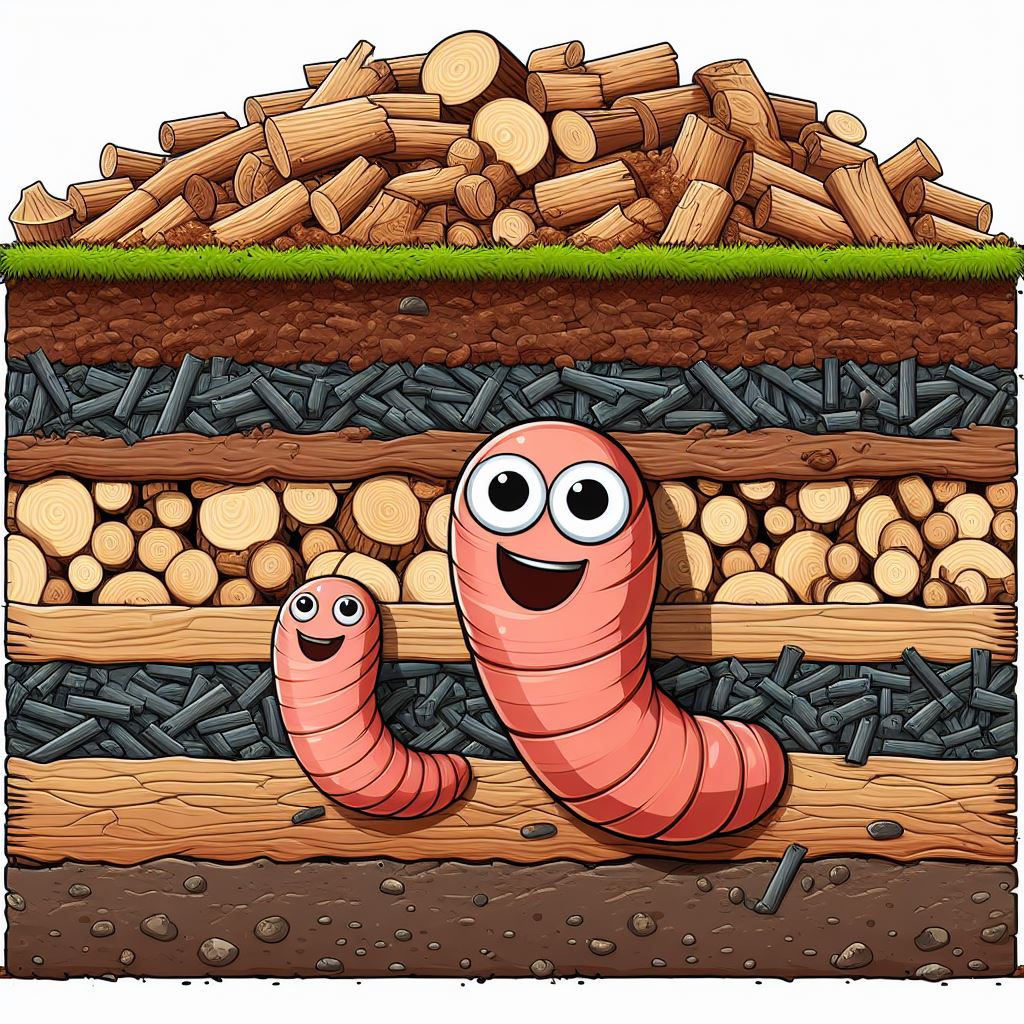The short answer is no, woodchip mulch does not make soil acidic.
However, if you are gardening on chalk, woodchip mulch will tend to reduce the pH closer to neutral.
Questions about mulch in general and in particular the effect of woodchips on soil arise with every generation of new gardeners.
People know that woodchips in compost need a lot of nitrogen to break down, so they wonder if woodchip mulch could steal nitrogen from the soil underneath?
Likewise, the sap-juices of most trees that’re released when the tree is freshly chipped whole are acidic. Does that fact have any bearing on soil pH?
Do Fresh Woodchips Make Soil More Acidic?
The first question is ‘are fresh woodchips / pine needles acidic?’, to which the answer is, yes, a bit, depending on the species of tree, but only when they are really fresh and green.
As they oxidise in the air and dry out, the acidic compounds in their fresh sap will turn into other things and be consumed by soil organisms.
Besides, the amount of sap in run-off from a layer of woodchips during rain (which is already acidic) is going to be small, very dilute, and spread over a large area of soil: it’s not doing anything to the pH.
The second question is the important one: can woodchip mulch actually turn the soil underneath it acidic? The answer there is a no if you mean acidify like sulphur would.
On the contrary, over time, woodchip mulch tends to pull soil pH away from the extremes, closer to the neutral / very mildly acidic conditions that are ideal for most plants.
Therefore, if your starting point is alkaline soil like chalk, then any organic matter mulch will very slowly acidify it only in the sense of pulling it closer to neutral.
But if your starting point is neutral or acidic soil, the added organic matter won’t acidify anything.
The difference is mostly this: I can make my soil more acidic by adding an element like sulphur. That sulphur will always be sulphur, whether it’s part of a sulfate molecule or alone as an element.
But I can pour acidic lemon juice all over my garden without acidifying it, because the citric acid in the lemon juice will keep getting broken down, eaten by soil life, etc.
Citric acid is only an acidic construct of Carbon, Oxygen, and Hydrogen that has no way to persist in the soil – it will never be cycled back into citric acid again, unlike sulphur which will go round and round in Sulphuric compounds forever.
Decaying organic matter is usually slightly acidic, so decaying woodchips are acidic in the same way that compost usually is (one batch of compost can vary from pH6, acidic, to pH8, alkaline, while it decomposes).
No one would suggest that compost acidifies soil in the sense that Sulphur does, even though compost will help to reduce the high pH of chalky soils in the long run … which yeah, is acidifying it.
Can Woodchips Deplete Soil Nitrogen?
There is another common question: do woodchips rob the soil of nitrogen?
This question exists because when woody plants (which are carbon rich) are freshly decomposing, the fungi involved do spread through the surrounding soil in search of nitrogen.
That is one reason why we always use well rotted organic material for potting soil mixes, for digging into the soil, and for germinating seeds. If it were not well rotted, the organisms digesting the organic material would indeed tie up nitrogen during the early decomposition process.
In a compost situation, if we had a lot of woodchips (brown material, high in carbon), we would want to mix them with plenty of “green” material that is high in nitrogen to make it break down quickly.
However, mulch is spread over the soil surface, not mixed down into the soil. The fungal activity in woodchip mulch will only affect the top few centimetres of soil: nothing that would affect a plant’s roots (the exceptions are sprouting seeds or little transplanted seedlings, which are vulnerable to fungal attack).
Woodchips make excellent mulch for all ornamental purposes, and for fruit trees & bushes.
On your vegetable beds, it’s not ideal for most plants: above all, you want instant nutrient release, so well rotted compost is better (straw has no nutrient value, but it’s handier than woodchips for veg growing: it shades the soil well, doesn’t harbour many fungi, and it won’t fall down the holes when you plant or dig things up!).
Even so, with long term perennial vegetables like an asparagus bed, where you aren’t digging them up or replanting every year, woodchips are a good choice.

If I only knew that woodchips are great for worms and other soil life, that would be enough to make me interested in spreading them all over my garden.
Soil life plus decaying organic matter is soil humus, the whole organic side of soil fertility (the inorganic side being the soil minerals and elements). Humus is the carbon rich organic matter that makes fertile topsoil dark.
A soil profile full of worms is automagically more fertile than one where the worms must withdraw deeper down for most of the year, because the surface is too dry.
And that’s not even thinking about all the worms and bugs that will live in the woodchips themselves.
Worms are the Great Makers of soil life, and two or three inches of woodchips will keep the soil underneath lovely and moist, with lots to eat for them pretty much throughout summer.

What are your thoughts and experiences with woodchips in the garden? Do you think they look messy or attractive?
